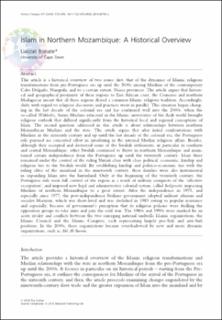| dc.contributor.author | Bonate, Liazzat | |
| dc.date.accessioned | 2021-09-20T16:24:11Z | |
| dc.date.issued | 2010-01-01 | |
| dc.identifier | oai:www.cmi.no:7899 | |
| dc.identifier.citation | in History Compass vol. 8 no. 7 pp. 573-593 | |
| dc.identifier.issn | 1478-0542 | |
| dc.identifier.uri | https://hdl.handle.net/11250/2779503 | |
| dc.description.abstract | This article is a historical overview of two issues: first, that of the dynamics of Islamic religious transformations from pre-Portuguese era up until the 2000s among Muslims of the contemporary Cabo Delgado, Nampula, and to a certain extent, Niassa provinces. The article argues that historical and geographical proximity of these regions to East African coast, the Comoros and northern Madagascar meant that all these regions shared a common Islamic religious tradition. Accordingly, shifts with regard to religious discourses and practices went in parallel. This situation began changing in the last decade of the colonial era and has continued well into the 2000s, when the so-called Wahhabis, Sunni Muslims educated in the Islamic universities of the Arab world brought religious outlook that differed significantly from the historical local and regional conceptions of Islam. The second question addressed in this article is about relationships between northern Mozambican Muslims and the state. The article argues that after initial confrontations with Muslims in the sixteenth century and up until the last decade of the colonial era, the Portuguese rule pursued no concerted effort in interfering in the internal Muslim religious affairs. Besides, although they occupied and destroyed some of the Swahili settlements, in particular in southern and central Mozambique, other Swahili continued to thrive in northern Mozambique and maintained certain independence from the Portuguese up until the twentieth century. Islam there remained under the control of the ruling Shirazi clans with close political, economic, kinship and religious ties to the Swahili world. By establishing kinship and politico-economic ties with the ruling elites of the mainland in the nineteenth century, these families were also instrumental in expanding Islam into the hinterland. Only at the beginning of the twentieth century, the Portuguese rule took full control of the region as a result of military conquests | |
| dc.language.iso | eng | |
| dc.relation | History Compass | |
| dc.relation | 7 | |
| dc.relation.ispartof | History Compass | |
| dc.relation.ispartofseries | History Compass vol. 8 no. 7 | |
| dc.relation.ispartofseries | History Compass vol. 8 no. 7 | |
| dc.relation.uri | https://www.cmi.no/publications/7899-islam-in-northern-mozambique-a-historical-overview | |
| dc.subject | Islam | |
| dc.subject | Mozambique | |
| dc.title | Islam in Northern Mozambique: A Historical Overview | |
| dc.type | Journal article | |
| dc.type | Peer reviewed | |
| dc.identifier.doi | 10.1111/j.1478-0542.2010.00701.x | |
